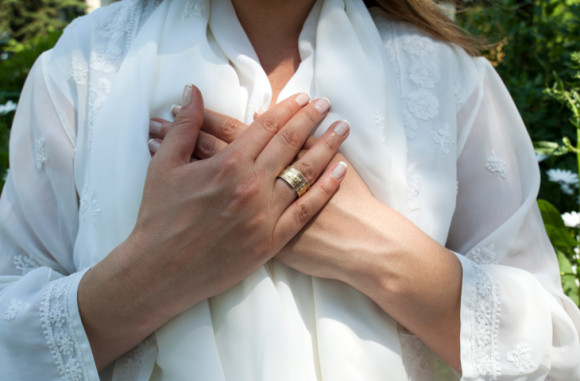Time Required
5 minutes, three to six days per week. Research suggests that people who practice the body scan for longer reap more benefits from this practice.
How to Do It
The body scan can be performed while lying down, sitting, or in other postures. The steps below are a guided meditation designed to be done while sitting. You can listen to audio of this three-minute guided meditation, produced by UCLA’s Mindful Awareness Research Center (MARC), in the player; if it doesn't play, you can find it here or download it from MARC's website.*
Especially for those new to the body scan, we recommend performing this practice with the audio. However, you can also use the script below for guidance for yourself or for leading this practice for others.
- Begin by bringing your attention to your environment, slowly looking around and noticing that you are safe in this moment.
- Bring your attention into your body.
- You can close your eyes if that’s comfortable for you or maintain a soft gaze, with your eyes partially closed but not focusing on anything in particular.
- You can notice your body seated wherever you’re seated, feeling the support of the chair or the floor beneath you.
- Take a few deep, long breaths, within the range of what is comfortable for you.
- And as you take a deep breath, bring in more oxygen, enlivening the body. And as you exhale, you might experience a sense of relaxing more deeply.
- You can notice your feet on the floor, notice the sensations of your feet touching the floor. The weight and pressure, vibration, heat.
- You can notice your legs against the chair, pressure, pulsing, heaviness, lightness.
- Notice your back against the chair, supporting you. If you are not able to notice sensations in all areas of the body, that is OK. We are more connected to certain areas of the body than others, at different times of the day.
- Bring your attention into your stomach area. If your stomach is tense or tight, can you allow it to soften? Take a breath.
- Notice your hands. Are your hands tense or tight? See if you can allow them to soften.
- Notice your arms. Feel any sensation in your arms. Do your best to allow your shoulders to be soft.
- Notice your neck and throat. Try to allow them be soft. See if you can invite a sense of relaxation in.
- Try to soften your jaw. Do your best to allow your face and facial muscles to be soft.
- Then notice your whole body present. Take one more breath.
- Be aware of your whole body as best you can. Take a breath. Slowly open up the eyes, without focusing on anything in particular. Allow the head and neck to gently rotate, taking in the space you are in. When you feel ready, you can return to your normal gaze.
* You can also listen to a 45-minute version of the Body Scan that the UC San Diego Center for Mindfulness uses in its trainings in Mindfulness-Based Stress Reduction.
Why You Should Try It
This exercise asks you to systematically focus your attention on different parts of your body, from your feet to the muscles in your face. It is designed to help you develop a mindful awareness of your bodily sensations, and to relieve tension when possible. Research suggests that this mindfulness practice can help reduce stress, improve your well-being, and decrease aches and pains.
Why It Works
Our body can sometimes be a source of pain and negative emotions, whether they are caused by injury or disease, or experiences of discrimination and prejudice. The body scan provides a rare opportunity for us to experience our body as it is, including any difficult feelings that come up, without judging or trying to change it.
It may allow us to notice and release a source of tension we weren’t aware of before, such as a hunched back or clenched jaw muscles. Or it may draw our attention to a source of pain and discomfort.
Our feelings of resistance and anger toward pain often only serve to increase that pain, and to increase the distress associated with it. According to research, by noticing the pain we’re experiencing, without trying to change it, we may actually feel some relief. Even if the pain doesn't go away, we can take steps to shift our relationship to pain and our relationship to our body in general.
The body scan allows us to work with these types of negative feelings. This practice may also increase our general attunement to our physical needs and sensations, which can in turn help us take better care of our body and make healthier decisions about eating, sleep, and exercise.
Evidence That It Works
Call, D., Miron, L., & Orcutt, H. (2014). Effectiveness of brief mindfulness techniques in reducing symptoms of anxiety and stress. Mindfulness, 5, 658-668.
A group of mostly white female undergraduate students in the Midwestern U.S. practiced an audio-guided Body Scan for three weekly 45-minute sessions and experienced reductions in anxiety and stress. Students who practiced hatha yoga within the same timeframe experienced similar benefits, suggesting that the Body Scan is an accessible alternative to hatha yoga practices.
Dambrun, M., Berniard, A., Didelot, T., Chaulet, M., Droit-Volet, S., Corman, M., Juneau, C., & Martinon, L. M. (2019). Unified consciousness and the effect of body scan meditation on happiness: alteration of inner-body experience and feeling of harmony as central processes. Mindfulness, 10, 1530-1544.
French psychology students practiced an audio-guided Body Scan, listened to relaxing music, or listened to an audiobook of a storybook tale for 21 minutes. Students who did the Body Scan increased in happiness, emotional stability, harmoniousness, and feelings of transcendence (unified consciousness). These increases were greater compared to those in students who listened to the relaxing music or audiobook.
Body Scan is one of the practices included in Mindfulness-Based Stress Reduction (MBSR). Developed by Jon Kabat-Zinn and based on Buddhist teachings, MBSR is a six- to 10-week program that teaches various mindfulness techniques through weekly sessions and homework assignments. More information about this program is available in Kabat-Zinn’s book Full Catastrophe Living.
Who Has Tried the Practice?
Additional studies explore how the Body Scan benefits people outside the U.S.:
- Terminal cancer patients in Hong Kong improved in overall mental health and reported feeling more peaceful, happy, and calm after 90 minutes of the Body Scan.
- Japanese people increased in self-compassion and decreased in symptoms of depression and anxiety after an eight-week mindfulness program that included the Body Scan.
- University students in South Korea experienced reductions in self-criticism and psychological distress, along with improvements in self-reassurance and mental health, after participating in a six-week program that included Body Scan, Mindful Breathing, and the Loving-Kindness Meditation.
Research suggests that MBSR, which includes the Body Scan, benefits the mental health of various groups, including the following:
- People in different cultures and countries, such as bilingual Latin-American families, university students in China, disadvantaged families in Hong Kong, low-income cyclo drivers in Vietnam, males with generalized anxiety disorder in Iran, Indigenous people in the Republic of Congo, and Aboriginal Australians.
- Women around the world, including pregnant women in China, rural women in India who experienced still-birth, at-risk women in Iran, Muslim women college students in the United Arab Emirates, American survivors of intimate partner violence, and socioeconomically disadvantaged Black women with post-traumatic stress disorder.
- People with certain diseases, such as New Zealanders with rheumatoid arthritis, male patients with heart disease in India, patients with diabetes in South Korea, cancer patients in Canada, breast cancer survivors in China, and HIV-positive individuals in Toronto, San Francisco, Iran, and South Africa.
More research is needed to explore whether, and how, the impact of this practice extends to other groups and cultures.
Keep in Mind
A 2015 study found that MBSR “improved depressive symptoms regardless of affiliation with a religion, sense of spiritually, … sex, or age.” However, other studies suggest that MBSR may not benefit everyone equally:
- When MBSR was administered in Massachusetts correctional facilities, male prisoners experienced less mental health improvement than female prisoners.
- MBSR may not be beneficial in all cultural contexts. For Haitian mental health practitioners and teachers, MBSR contradicted some of their cultural worldviews and everyday practices. Brazilian medical students who participated in MBSR experienced no significant changes in mental health or quality of life.
Sources
Diana Winston, Ph.D., UCLA Mindful Awareness Research Center
Steven D. Hickman, Psy.D., UC San Diego Center for Mindfulness
References
Adelian, H., Sedigheh, K. S., Miri, S., & Farokhzadian, J. (2021). The effect of mindfulness-based stress reduction on resilience of vulnerable women at drop-in centers in the southeast of Iran. BMC Women's Health, 21, 1–10.
Fogarty, F. A., Booth, R. J., Lee, A. C., Dalbeth, N., & Consedine, N. S. (2019). Mindfulness-based stress reduction with individuals who have rheumatoid arthritis: Evaluating depression and anxiety as mediators of change in disease activity. Mindfulness, 10(7), 1328–1338.
Gallegos, A. M., Heffner, K. L., Cerulli, C., Luck, P., McGuinness, S., & Pigeon, W. R. (2020). Effects of mindfulness training on posttraumatic stress symptoms from a community-based pilot clinical trial among survivors of intimate partner violence. Psychological Trauma: Theory, Research, Practice, and Policy, 12(8), 859–868.
Gayner, B., Esplen, M. J., DeRoche, P., Wong, J., Bishop, S., Kavanagh, L., & Butler, K. (2012). A randomized controlled trial of mindfulness-based stress reduction to manage affective symptoms and improve quality of life in gay men living with HIV. Journal of Behavioral Medicine, 35(3), 272–285.
Greeson, J. M., Smoski, M. J., Suarez, E. C., Brantley, J. G., Ekblad, A. G., Lynch, T. R., & Wolever, R. Q. (2015). Decreased symptoms of depression after mindfulness-based stress reduction: Potential moderating effects of religiosity, spirituality, trait mindfulness, sex, and age. The Journal of Alternative and Complementary Medicine, 21(3), 166–174.
Hecht, F. M., Moskowitz, J. T., Moran, P., Epel, E. S., Bacchetti, P., Acree, M., Kemeny, M. E., Mendes, W. B., Duncan, L. G., Weng, H., Levy, J. A., Deeks, S. G., & Folkman, S. (2018). A randomized, controlled trial of mindfulness-based stress reduction in HIV infection. Brain, Behavior, and Immunity, 73, 331–339.
Ho, R. T. H., Lo, H. H. M., Fong, T. C. T., & Choi, C. W. (2020). Effects of a mindfulness-based intervention on diurnal cortisol pattern in disadvantaged families: A randomized controlled trial. Psychoneuroendocrinology, 117, 7.
Hoffman, D. M. (2019). Mindfulness and the cultural psychology of personhood: Challenges of self, other, and moral orientation in Haiti. Culture & Psychology, 25(3), 302–323.
Jung, H. Y., Lee, H., & Park, J. (2015). Comparison of the effects of Korean mindfulness-based stress reduction, walking, and patient education in diabetes mellitus. Nursing & Health Sciences, 17(4), 516–525.
Kabat-Zinn, J., De Torrijos, F., Skillings, A. H., Blacker, M., Mumford, G. T., Alvares, D. L., & Rosal, M. C. (2016). Delivery and effectiveness of a dual language (English/Spanish) Mindfulness-Based Stress Reduction (MBSR) program in the inner city - A seven-year experience: 1992-1999. Mindfulness & Compassion, 1(1), 2–13.
Kabat-Zinn, J., & Hanh, T. N. (2009). Full catastrophe living: Using the wisdom of your body and mind to face stress, pain, and illness. Delta.
Lavrencic, L. M., Donovan, T., Moffatt, L., Keiller, T., Allan, W., Delbaere, K., & Radford, K. (2021). Ngarraanga giinganay (‘thinking peacefully’): Co-design and pilot study of a culturally-grounded mindfulness-based stress reduction program with older First Nations Australians. Evaluation and Program Planning, 87, 12.
Le, T. N. (2017). Cultural considerations in a phenomenological study of mindfulness with Vietnamese youth and cyclo drivers. International Perspectives in Psychology: Research, Practice, Consultation, 6(4), 246–260.
Li, J., & Qin, X. (2021). Efficacy of mindfulness‐based stress reduction on fear of emotions and related cognitive behavioral processes in Chinese university students: A randomized controlled trial. Psychology in the Schools, 1–17.
Majid, S. A., Seghatoleslam, T., Homan, H. A., Akhvast, A., & Habil, H. (2012). Effect of mindfulness based stress management on reduction of generalized anxiety disorder. Iranian Journal of Public Health, 41(10), 24–28.
McIntyre, T., Elkonin, D., de Kooker, M., & Magidson, J. F. (2018). The application of mindfulness for individuals living with HIV in South Africa: A hybrid effectiveness-implementation pilot study. Mindfulness, 9(3), 871–883.
Neto, A. D., Lucchetti, A. L. G., Ezequiel, O. S., & Lucchetti, G. (2020). Effects of a required large-group mindfulness meditation course on first-year medical students’ mental health and quality of life: A randomized controlled trial. Journal of General Internal Medicine, 35(3), 672–678.
Noh, S. & Cho, H. (2020). Psychological and physiological effects of the mindful lovingkindess compassion program on highly self-critical university students in South Korea. Frontiers in Psychology, 11, 2628.
Parswani, M. J., Sharma, M. P., & Iyengar, S. S. (2013). Mindfulness-based stress reduction program in coronary heart disease: A randomized control trial. International Journal of Yoga, 6(2), 111.
Roberts, L. R., & Montgomery, S. B. (2016). Mindfulness-based intervention for perinatal grief in rural India: Improved mental health at 12 months follow-up. Issues in Mental Health Nursing, 37(12), 942–951.
Samuelson, M., Carmody, J., Kabat-Zinn, J., & Bratt, M. A. (2007). Mindfulness-based stress reduction in Massachusetts correctional facilities. The Prison Journal, 87(2), 254–268.
SeyedAlinaghi, S., Jam, S., Foroughi, M., Imani, A., Mohraz, M., Djavid, G. E., & Black, D. S. (2012). Randomized controlled trial of mindfulness-based stress reduction delivered to human immunodeficiency virus-positive patients in Iran: effects on CD4⁺ T lymphocyte count and medical and psychological symptoms. Psychosomatic Medicine, 74(6), 620–627.
Speca, M., Carlson, L. E., Goodey, E., & Angen, M. (2000). A randomized, wait-list controlled clinical trial: The effect of a mindfulness meditation-based stress reduction program on mood and symptoms of stress in cancer outpatients. Psychosomatic Medicine, 62(5), 613–622.
Takahashi, T., Sugiyama, F., Kikai, T., Kawashima, I., Guan, S., Oguchi, M., . . . Kumano, H. (2019). Changes in depression and anxiety through mindfulness group therapy in Japan: The role of mindfulness and self-compassion as possible mediators. BioPsychoSocial Medicine, 13, 10.
Thomas, J., Raynor, M., & Bahussain, E. (2016). Stress reactivity, depressive symptoms, and mindfulness: A Gulf Arab perspective. International Perspectives in Psychology: Research, Practice, Consultation, 5(3), 156–166.
Tsang, S. C., Mok, E. S., Lam, S. C., & Lee, J. K. (2012). The benefit of mindfulness‐based stress reduction to patients with terminal cancer. Journal of Clinical Nursing, 21(17–18), 2690–2696.
Vinesett, A. L., Whaley, R. R., Woods-Giscombe, C., Dennis, P., Johnson, M., Li, Y., Mounzeo, P., Baegne, M., & Wilson, K. H. (2017). Modified African Ngoma healing ceremony for stress reduction: A pilot study. The Journal of Alternative and Complementary Medicine, 23(10), 800–804.
Waldron, E. M., & Burnett-Zeigler, I. (2021). The impact of participation in a mindfulness-based intervention on posttraumatic stress symptomatology among Black women: A pilot study. Psychological Trauma: Theory, Research, Practice, and Policy, 14(1), 29–37.
Williams, J. M., & Kabat-Zinn, J. (2013). Mindfulness: Diverse perspectives on its meaning, origins and applications at the intersection of science and dharma. Routledge.
Zhang, J., Cui, Y., Zhou, Y., & Li, Y. (2019). Effects of mindfulness-based stress reduction on prenatal stress, anxiety and depression. Psychology, Health & Medicine, 24(1), 51–58.
Zhang, J., Zhou, Y., Feng, Z., Fan, Y., Zeng, G., & Wei, L. (2017). Randomized controlled trial of mindfulness-based stress reduction (MBSR) on posttraumatic growth of Chinese breast cancer survivors. Psychology, Health & Medicine, 22(1), 94–109.
The Body Scan Meditation helps us become more aware our bodies, an awareness we often neglect. Are you attuned to the present moment? Take our Mindfulness quiz to find out:

 This practice is part of the
This practice is part of the






Comments
and Reviews
Debi M. Nava_1
I would never have believed that cold sore herpes virus can be cured with ancient herbal medicine because I just tested negative for the second time since I finished drinking the medicine a herbal doctor sent to me, all the sores and blisters were gone immediately I started drinking the herbal meds, so I want you all to know that herpes virus can be cured with the right use of ancient herbal medicine so visit this herbalist called doctor excel on his Email: drahonsie00@gmail.com WhatsApp: +2348039482367 https://drahonsie002.wixsite.com/dr-ahonsie
Baylee
Zoe Byrd
I meditate daily which includes body scans. I will add this 5 minute body scan daily. Body scans keep the mind in the present moment while noticing bodily sensations. Vipassana meditation, teaches one to accept "what is" in every moment with the realization that the only thing that is constant is the certainty of change. "This too shall pass" whether pleasant or unpleasant. "No aversion, no craving". "Equanimous mind". Bound to succeed! The body scanning practice is also relaxing, feels safe, raises awareness of the over arching reality that all is well and more.
dahlia
Great!
Valerie
Camila Sophia
It’s important to understand that natural herbs are vital to health and well-being. Many individuals continue to suffer from various illnesses and viruses due to the effects of chemical-based medications and the dietary recommendations often prescribed in conventional medical settings. I have a selection of carefully chosen herbal products that I truly believe can support and improve your overall health including treatment(cure) for herpes. If you're interested, I would be happy to recommend them to you. Email drchalopa@gmail.com
The Greater Good Toolkit
Made in collaboration with Holstee, this tookit includes 30 science-based practices for a meaningful life.
The Greater Good Toolkit
Made in collaboration with Holstee, this tookit includes 30 science-based practices for a meaningful life.